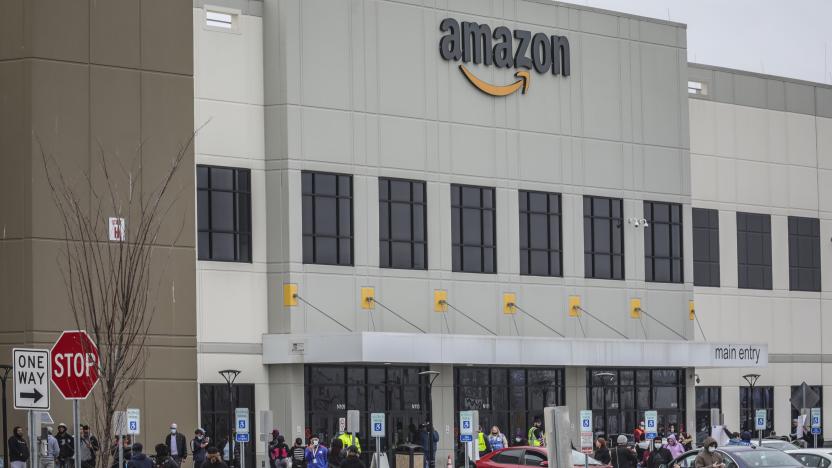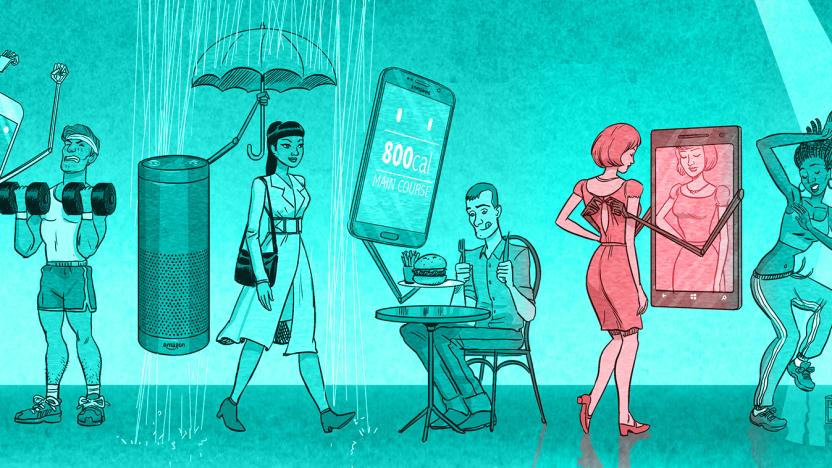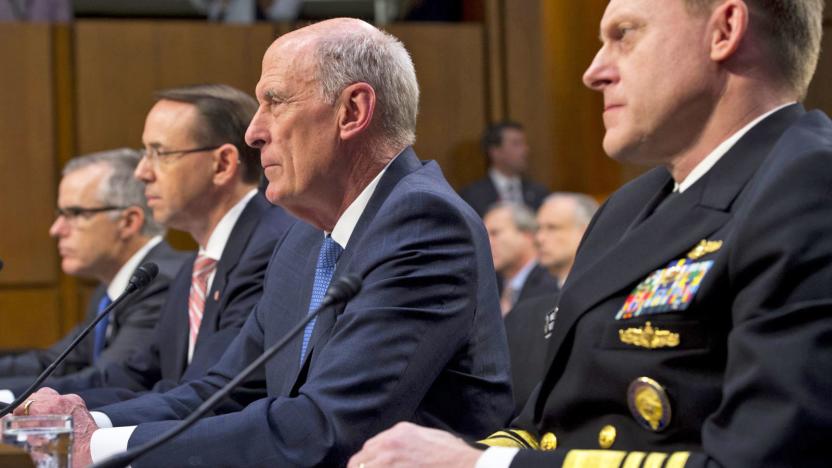United States
Latest

Skype can now make 911 calls in the United States
It can also share your location with emergency services.

US invests $232 million in at-home, phone-based COVID-19 tests
Ellume will open a factory in the US to ramp up production.

Amazon workers plan Black Friday strikes and protests in 15 countries
Demands include improved pay and safety conditions, and transparency over privacy and user data.

UN says US fears over Huawei’s 5G are politically motivated
The secretary general of the UN's internet and telecoms agency has suggested US concerns about 5G networks built using Huawei equipment have more to do with politics and trade, rather than legitimate worries over security. "There is no proof so far," Houlin Zhao, head of the International Telecommunication Union, said regarding claims about Huawei's security. He noted it's in telecoms' best interests to make sure their infrastructure is secure as they might otherwise feel the wrath of authorities.

Twitter can’t separate verification from validation
2016 was a dumpster fire of a year for Twitter. Abusive language and toxic interaction became the norm across the microblogging site as it saw a dramatic rise in activity from users on the far right and their crystallization into the alt-right movement. But for as painful as last year was for the company, 2017 has seen it steadfastly refuse to do little else but pour more gasoline on the flames.

America’s cash-free future is just around the corner
Shake Shack's next burger joint at Astor Place in NYC doesn't want your money -- at least not the physical variety. In an effort to reduce the "friction time" between paying for your meal and eating it, the company plans to replace human cashiers for automated kiosks which won't accept actual bills and coins, only cards. This move is part of a global trend away from cash-based economies and towards Star Wars-style credits. But could such a monetary revolution actually benefit all Americans? Don't bet on it.

Why buy the cow when you can biofabricate the milk for free?
Thought to have been Lord Krishna's favorite animal, the cow has achieved a uniquely sacred status in India. Their slaughter is prohibited through most of the country, beef consumption is largely outlawed as well and woe be the unlucky soul accused of breaking those taboos. In the US, however, that's not the case. We Americans love our cows. We love them so much that we ate a whopping 25.668 billion pounds of beef in 2016, according to the National Cattlemen's Beef Association. There are 93.5 million heads of cattle in this country, but thanks to emerging biofabrication technologies, they could soon be as safe from the slaughterhouse as the cows of Delhi.

'Timberscrapers' could soon dominate urban skylines
They just don't make 'em like the Sakyamuni Pagoda anymore. Built from wood in 1056 in the Shanxi province of China, the building has remained standing to this day, despite seven earthquakes rattling the region within its first 50 years of existence. Since then, it's held up against a slew of seismic events, even when more-modern structures have failed. Now, thanks to recent advancements in timber technology, modern architects are rediscovering the benefits of working with wood.

The West Coast is finally getting an earthquake early warning system
On September 19th, 1985, Mexico City was devastated by an 8.0 magnitude earthquake that killed as many as 30,000 people and leveled buildings across the city, including the 12-story Hospital Juárez, one of the oldest hospital institutions in Mexico. In response, the government set about creating the world's first earthquake warning system. One that, when an 8.1 tremblor set in on the city September 7th of this year, and a second 7.1 less than two weeks later, saved potentially tens of thousands of lives by giving them more than a minute's notice to head to safety. So why doesn't America have one along its Pacific coast as well? Turns out we almost do.

Ya Doggie solves the pet food problem you didn't know you had
The adage that "dogs grow to resemble their owners" is not much of a compliment anymore in America -- namely because it portends that our pets will become as portly as their people. In fact, as CBS News reported earlier this year, a third of American dogs are considerably heavier than they should be and it's shortening their lifespans. However, a smart pet food scoop from Santa Cruz, CA-based Ya Doggie promises to not only help establish better feeding habits but also save you from kibble runs.

A lawsuit almost stalled NASA's Cassini mission
Capt. Scott Kelly wasn't kidding when he famously quipped that "space is hard." Even getting to the launch pad can prove to be a daunting challenge. Take the Cassini mission to study Saturn, for example. Despite an investment of $3.4 billion and nearly a decade of development, Cassini wound up being very nearly scuttled at the last minute by protesters who thought they knew better than a federal agency that has put multiple men on the moon. Geez guys, it was just 73 pounds of plutonium riding aboard that Saturn orbiter -- it wouldn't have caused that much damage had something gone horribly wrong at launch.

Teaming humans with robotic AI will remake modern manufacturing
Your public school education exists, in large part, thanks to the Second Industrial Revolution. When the revolution took hold of America in the 1870s, 30 years after the end of the first, half of the US population still spent their days toiling in fields. Education was typically voluntary, assuming the family was wealthy enough to afford tutors or school fees, and usually reserved for boys. With the development of commercial fertilizer and the internal combustion engine, productivity exploded while the number of farmers dropped to less than two percent of the population. It lessened the demand for child labor which in turn led to increased support for compulsory education for both sexes.

Watson is helping heal America's broken criminal-sentencing system
The American criminal-justice system's sentencing system is among the fairest and most equitable in the world ... assuming you're wealthy, white and male. Everybody else is generally SOL. During the past three decades, America's prison population has quadrupled to more than 2.3 million people. Of those incarcerated, 58 percent are either black or Latino (despite those groups constituting barely a quarter of the general US population). The racial disparity in America's justice system is both obvious and endemic, which is why some courts have started looking for technological solutions. But can an artificial intelligence really make better sentencing recommendations than the people who designed it? We're about to find out.

One week with Microsoft Cortana
"Never mind it. Never mind," I cursed, looking down on the poorly formed monstrosity that gazed back at me with a singular pulsing eye. No, not at me -- through me. This was not my trusty Google Assistant, with whom I shared a deep logistical and day-planning-based bond. This thing barely looked like the AI to which I was accustomed and -- even then -- only in passing. This alien program appears to have eaten my digital assistant and started wearing its skin -- and I'm about to spend the next week having it organize my life.

Robot bears are coming for your grandparents
Not content to simply blame millennials for killing practically everything, baby boomers are now expecting the younger generations to care for them in their agedness. The nerve. Indeed, some 13 percent of the American population is now 65 or older, though a recent report from the Pew Research Center suggests that figure will nearly double by midcentury. Given that the current annual median price of a nursing-home room is around $92,000 (and rising), and because we can't just up and dump a quarter of America at the Springfield Retirement Castle, robots will have to start lending elderly folks a hand. Because if there's anybody who inherently trusts new and confusing technologies, it's the olds.

3D printing will revolutionize how the Marine Corps fights
"The people closest to the problem are also the people closest to the solution," Capt. Chris Wood, co-lead for Additive Manufacturing with the US Marine Corps, told Engadget. In 2016, the USMC put that adage to the test as it launched the Logistics Innovation Challenge, a program "to solicit ideas from Marines, sailors and civilians from across the Marine Corps" that would address challenges that they face in their daily duties. And this is only the start to the US Military's additive-manufacturing aspirations. Pretty soon, everything from ammunition to autonomous vehicles could come from the Corps' cadre of 3D printers.

Will we be able to control the killer robots of tomorrow?
From ship-hunting Tomahawk missiles and sub-spying drone ships to semi-autonomous UAV swarms and situationally-aware reconnaissance robots, the Pentagon has long sought to protect its human forces with the use of robotic weapons. But as these systems gain ever-greater degrees of intelligence and independence, their increasing autonomy has some critics worried that humans are ceding too much power to devices whose decision-making processes we don't fully understand (and which we may not be entirely able to control).

'Asteroid Day' is a good time to learn about the threat of space rocks
On June 30th, 1908, more than 770 square miles of remote Russian forest were obliterated from the face of the Earth when a relatively small meteor, estimated at only around 400 feet across, unleashed 15 megatons of energy above the Stony Tunguska River. One hundred and nine years later, humanity knows precious little more about the dangers that lurk within our solar system than we did in 1908. But a recently founded "global day of education" aims to bring the existential threat that space rocks pose to the forefront of our collective consciousness.

Tweets will be official presidential records if the Covfefe Act passes
America's 45th president has a habit of writing and then deleting his social media posts and US Representative Mike Quigley wants him to stop. As such, Quigley on Monday introduced legislation to force the National Archives to include "social media" as part of the Presidential Records Act and he's calling it the Communications Over Various Feeds Electronically for Engagement, or "Covfefe" Act.

US intelligence wants to make a key foreign surveillance law permanent
The directors of America's federal intelligence agencies appeared before the Senate Intelligence Committee on Wednesday in an effort to convince the governing body to permanently extend Section 702 of the Foreign Intelligence Surveillance Act, a law that enables the federal government to monitor the communications of non-US citizens on foreign soil who are communicating with Americans here in the United States regarding matters of national security. Essentially, it enabled the intelligence community to eavesdrop on conversations between suspected terrorists and their associates, even if some of them happen to be US citizens.


